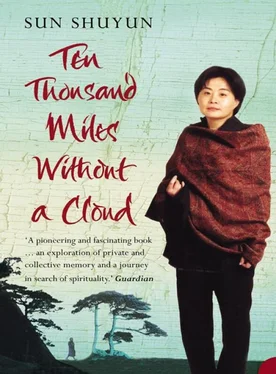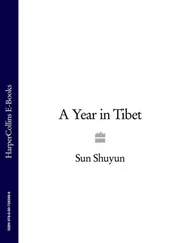Father had a deep affection for Grandmother. He never talked about it but he was full of regret and remorse about abandoning his own parents – he never saw them again after he joined the army; his mother went mad missing him and drowned herself, and his father died too while he was in Korea. He treated Grandmother with enormous respect and kindness. She had bound feet and it was very hard to buy shoes for her. Every time he went on a work trip somewhere, he would search all the department stores and always came back with a few pairs. Grandmother was very grateful; she would say to my mother: ‘How lucky you are to have such a wonderful husband! Kindness and prayer do pay.’
For all his affection, Father found Grandmother’s behaviour embarrassing. She made no secret of her faith and was kind to people who were in political trouble and shunned by everyone else. Father asked my mother to talk to her about the matter. My mother worked in the nursery of my father’s regiment and she was very aware of the political pressures. She had seen too many people being denounced for an innocent remark or for no reason at all. Grandmother was a potential threat to Father’s career in the army. The Party had its eyes and ears in the neighbourhood committees, which knew exactly what went on in every household. Father could get into trouble for not ‘keeping his house in order’ and not taking a firm stand against feudal practices and the enemies of the people. Long before I was born, my parents had persuaded Grandmother not to go to the temples, or burn incense at home. My father even sold her ‘superstitious article’ – a little bronze statue of Guanyin and her most precious possession – to the rag-and-bone man.
Grandmother was deeply hurt. The statue was her amulet. She thought her prayers had been effective: her children and grandchildren were healthy; her daughter was lucky to have found a good husband; her son-in-law was safe from political persecution. Perhaps she got the point from my mother’s explanation. Particularly at that time, when my father’s job in military supply was keeping the family fed while so many were going hungry. The great famine which began in 1959 and claimed over thirty million people was coming to an end, but the country was still suffering. Farmers back in Grandmother’s village were too weak to plough the fields; factories were shut down; very few children were born – starvation had made women infertile. On top of everything, parts of China were going through appalling drought, while others were afflicted by severe floods.
Reluctantly, in the face of all the misery the Party relaxed its grip, not only in its economic policy but also in its ideological control. But what followed took Mao and the Party by surprise: the masses who had survived the hunger immediately returned to their old gods and goddesses for solace and divination – they even built new temples. They were not just old ladies like Grandmother, but even Party members. Mao must have found this very discouraging, particularly after thirteen years of intensive campaigns to educate the masses and implant socialist ideas. He had lost confidence in the Marxist-Leninist ‘law’ that religion would fade as socialism developed – it was on this basis that a guarantee of freedom of religious belief had been included in the Constitution. Mao resorted to his old method, mass campaigns. The Campaign against Superstitious Activities and the Socialist Education Campaign began in 1963, the year I was born.
They were some of the biggest programmes Mao launched prior to the Cultural Revolution. Hundreds of thousands of civil servants, teachers, doctors, artists, engineers and soldiers were sent to the rural areas to reinforce the Communist ideology. My father went to a commune near his military base. For four months he helped the farmers with their work, ate with them, and slept in their huts to gain their confidence. He spent days and nights persuading the activists of the village to target what the Party regarded as the residue of feudalism: traditional Chinese medicinal practice and funeral customs, fortune-telling and arranged marriage, and visiting local temples. Father lectured them not to put their faith in God, but in the Party, echoing a verse of the time written by a loyal farmer:
God, O God, be not angry,
Step down as quickly as you can.
I revered you for a long time,
And yet you changed nothing
And our farms were still ploughed by the ox.
Mechanization is now being carried out,
I request you to transform yourself.
But instead of helping him root out the die-hard believers, the locals took advantage of the struggle meetings he organized to voice their grievances. They told him about the suffering and deaths in their villages during the recent famine – the worst they could remember. They begged him to go back and tell the Party the real problems in the countryside. Superstition was not on their minds – survival was.
Father had a frustrating four months, and he was even more disappointed when he returned home. I was born, his third daughter. Despite Mao’s claim that women were half the sky and the absolute equal of men, my father desperately wished for a son to keep the Sun family line going. A veteran Communist, he none the less believed in a dictum of Confucius, as all Chinese had done for more than two thousand years: the biggest shame for a family is to fail to produce a son. Now my mother had borne yet another girl, instead of the much-wanted boy. Father was so disappointed he did not even visit Mother and me in hospital. We were left there for three days and it was Grandmother who brought us food and took us home. Years later Grandmother told me what happened – the only fight she ever had with Father.
She prepared a special meal to welcome Father, Mother and me home. But Father, even while he was gulping down the dishes that Grandmother conjured up, could talk about nothing but his headaches and successes during the campaign. ‘They were really backward in the villages. Even the cadres weren’t good Communists. They allowed temples and family shrines to be rebuilt. We had a good go at them. We banged away at the village officials, then we asked them to identify the most superstitious people. If they didn’t cooperate, we would take away their jobs. There were some really stubborn ones; you can guess where they ended up.’
When Father had finished his meal, he cast a casual glance at me in the pram, shook his head, and sighed. He turned to my mother. ‘Why didn’t you give me a son?’
My mother was very apologetic. Back in her village, there was a saying: ‘A hen lays eggs. A woman who cannot produce a son is not worth even a hen.’ Years ago Father could simply have taken a concubine to give himself another chance. He could not do that now but he had other ways of showing his displeasure. And I, the unwanted girl, could not be drowned as in the bad old days; instead I would bear the brunt of his disappointment.
Then Grandmother made a rare intervention; ‘It wasn’t her fault. You should blame me.’
‘What has it got to do with you?’ Father asked impatiently.
Grandmother said she felt responsible for my birth. In the Lotus Sutra there is a passage which many Chinese, Buddhist and even non-Buddhist, passionately believe: ‘If there is a woman who desires to have a son, then she should pray to Guanyin with reverence and respect, and in due time she will give birth to a son endowed with blessings, virtues and wisdom.’ My mother desired a son as much as my father and grandmother, but she was a Communist and would never think that praying, even to Chairman Mao, let alone to anyone else, would get her a son. So Grandmother decided it was her job to do the praying for our family. But she could only say her prayers at home, silently and late at night. She could not go to the temples and bow in front of the statue of Guanyin; she could not offer incense to send a message to her – Mao had all the incense factories switched to making toilet paper in 1963. Grandmother thought it was unpropitious: if the goddess did not hear her prayers or receive her message, how could she ensure a much-desired son for our family? That was why my parents were given a girl, an inferior being.
Читать дальше












